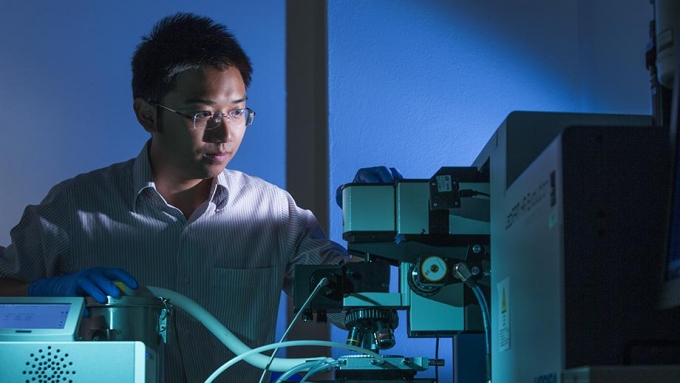Dr Hieu Nguyen, a Senior Research Fellow and Lecturer at the ANU College of Engineering and Computer Science (CECS), has won a Vietnam Outstanding Young Faces Award in the Scientific Research category.
The annual award is presented to Vietnamese citizens under the age of 35 “with excellent performances in their areas over the previous year”. Winners receive a cash prize of 50 million VND ($3,000 Australian).
Of the ten winners selected in categories such as public service, sports, culture, and business, Nguyen is the only one who resides outside of Vietnam. He welcomes the award as a way to connect with his large extended family there.
“They are very proud and happy because the news is on all mainstream media,” he said. “But I think most people are interested because there is a Miss Grand International and a famous athlete on the list.”
Nguyen left Vietnam in 2009 when he moved to the United States to continue his education. He said that in the past, he had made trips back to Vietnam once per year, but he has not been able to visit since the onset of the global pandemic in 2020.
The award ceremony will be held on 26 March in Hanoi, but Nguyen said he will not attend due to commitments here in Canberra. Although his “bigger family” is in Vietnam, he is now a husband and father with a “little family” here in Australia.
One in a hundred million
Nguyen explained his inclusion on the list not by citing his innovations in solar energy technologies, nor his 75 scientific peer-reviewed journal papers, nor his 2018 Deans Award for Excellence in Supervision or his 2020 Deans Award for Remote Teaching. Instead, he said that the Vietnamese Embassy, located across the lake from ANU in Australia’s capital city, “actively watches for successful stories of Vietnamese citizens in Australia”.
Last year, the embassy nominated him for the Vietnam Golden Globe Awards in Science and Technologies, which resulted in an Early Career Scientists award. It was the awards committee from the Vietnam Golden Globes that put forth his name for the Ten Most Outstanding Young Faces of Vietnam.
“This gives me a strong motivation to continue what I have been doing — performing good research and teaching, supervising and nurturing my students, and mentoring more junior colleagues,” he said.
Vietnam has a population of 99 million people, and Nguyen is quick to point out that it is home to thousands of outstanding researchers deserving of recognition. And there are many more, he said, among 4.5 million overseas Vietnamese, including several of his colleagues at ANU and former colleagues in the United States.
After graduating from Portland State University, Nguyen worked as a product yield engineer at Intel, where he received the Intel Global Test Manufacturing Group (TMG) Excellence award in 2012. A scholarship allowed him to come to ANU for his PhD (photovoltaics), which he earned in 2016. In 2017, he served as a visiting scientist at the United States’ National Renewable Energy Laboratory (NREL).
Lighting the way to net zero emissions ————————————–
A lifelong goal to make the world a better place through technology has led Nguyen to a research and development career in photovoltaic electric systems — a space that is becoming increasingly important if we are to realise net zero emissions.
Since becoming a Research Fellow and Lecturer at CECS, Nguyen’s research has focused on the interactions between light and matter in solar energy materials and devices, studying the relationship between absorbed and emitted light to optiimise optical, electrical, chemical, and structural engineering.
Among his team’s more celebrated innovations is a luminescence spectroscopy technique that captures high-resolution images of light reflected from semiconductor materials, accomplishing in seconds what had previously taken a week. The images capture only those bands of light known to reflect off of specifically chosen materials.
“We can extract different information with incredible depth,” Nguyen said. “Examining the light being emitted allows us to hone in on the most efficient material to use.”
The new optical technology has applications in material science as well as renewable energy, making possible a fuller understanding of structural, morphological, and optical properties and leading to more efficient conversion of sunlight to electrical energy.
Recently Nguyen and his research team were awarded a million dollars from the Australian Renewable Energy Agency to establish an Optical Spectroscopy & Imaging Laboratory to continue developing this work. With $370k co-funding from ANU, the lab will host a research cluster for advanced optical characterisation for photovoltaic solar cells.
“Ten years ago, solar photovoltaics was a hot topic, a path to tackle the threat of climate change. The bulk part of solar cells is semiconductors. That’s why I decided to follow this area, to both utilise my background and do something meaningful to the world,” he said.
Nguyen estimates that about 20 per cent of his time goes to teaching and mentoring. He makes a practice of integrating his research into his lectures, which helps him recruit student researchers to join his team. Dr Thien Truong and Dr Mike Tebyetekwewa are two examples. Currently postdocs at ANU and the University of Queensland, both are former PhD students who have contributed significantly to Nguyen’s research over the past 4 years.

